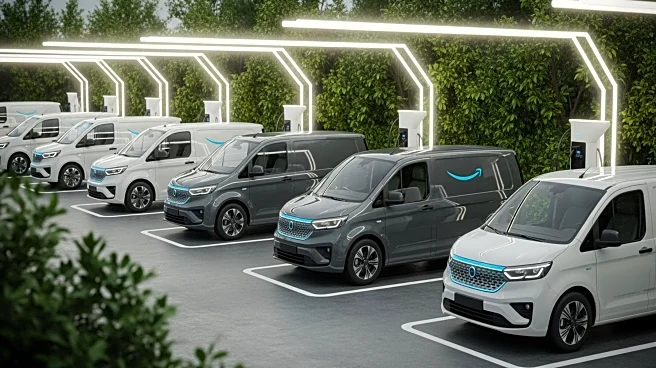What's Happening?
Amazon is significantly expanding its electric vehicle fleet in the UK as part of its commitment to achieving net-zero carbon emissions by 2040. The company has added nearly 1,000 new electric vans and heavy-goods
trucks, including 160 electric heavy-goods vehicles (eHGVs), marking the largest single order of eHGVs in the UK. This expansion is part of Amazon's broader strategy to enhance its logistics operations with sustainable transportation solutions. The new fleet will facilitate the movement of products between Amazon's logistics hubs across the UK, contributing to the company's global fleet of over 35,000 electric delivery vans.
Why It's Important?
Amazon's investment in electric vehicles underscores its commitment to sustainability and reducing carbon emissions. By expanding its electric fleet, Amazon is setting a precedent for other companies in the logistics and transportation sectors to follow suit. This move not only aligns with global environmental goals but also enhances Amazon's operational efficiency and reduces its carbon footprint. The initiative is likely to influence industry standards and encourage further adoption of electric vehicles, contributing to the UK's efforts to reduce emissions and promote clean energy solutions.
What's Next?
Amazon's expanded electric fleet is expected to travel the annual equivalent of more than 450 trips around the Earth, carrying over 300 million products. As the fleet becomes fully operational, Amazon will likely continue to invest in infrastructure to support electric vehicles, such as installing fast charging points at its sites. This development may prompt other logistics companies to accelerate their transition to electric vehicles, potentially leading to increased demand for electric vehicle manufacturing and charging infrastructure.
Beyond the Headlines
Amazon's initiative may have broader implications for the electric vehicle market, potentially driving innovation and competition among manufacturers. The company's commitment to sustainability could also influence consumer perceptions and expectations, encouraging more environmentally conscious purchasing decisions. Additionally, the expansion of electric fleets may lead to regulatory changes and incentives to support the adoption of clean energy technologies.










